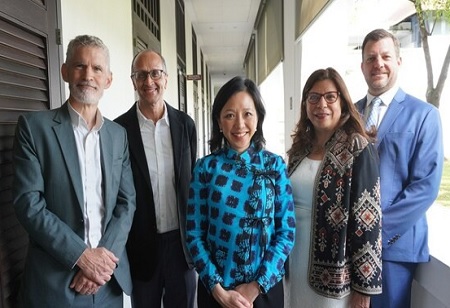
NUS and Rockefeller Boost Renewable Energy Connectivity in Southeast Asia

 The Lee Kuan Yew School of Public Policy's Institute for Environment and Sustainability (IES) at the National University of Singapore and The Rockefeller Foundation have announced a joint effort to accelerate Southeast Asia's energy transition. Supported by a US$275,000 (SG$ 330,000) grant, IES will initiate a new climate policy fellowship and facilitate a series of dialogues over the next two years involving national and regional leadership. The aim is to bolster regional energy connectivity in Southeast Asia. This collaboration intends to strengthen the capacity for delivering renewable energy from one country to high-demand areas in neighboring countries.
The Lee Kuan Yew School of Public Policy's Institute for Environment and Sustainability (IES) at the National University of Singapore and The Rockefeller Foundation have announced a joint effort to accelerate Southeast Asia's energy transition. Supported by a US$275,000 (SG$ 330,000) grant, IES will initiate a new climate policy fellowship and facilitate a series of dialogues over the next two years involving national and regional leadership. The aim is to bolster regional energy connectivity in Southeast Asia. This collaboration intends to strengthen the capacity for delivering renewable energy from one country to high-demand areas in neighboring countries.
Professor Benjamin W. Cashore, Director of IES, said, "It is our immense pleasure to be associated with The Rockefeller Foundation to facilitate regional energy connectivity dialogue in Southeast Asia. This grant will enable our institute to build the analytic, managerial, and technical capacity needed to identify innovative policy mixes for effective and lasting climate policy pathways, crucial for closing the observed gaps between national climate commitments and the policies and legislation to achieve them. We hope to support the efforts of climate policymakers through our research and dialogue".
The grant from The Rockefeller Foundation enables IES to establish a novel fellowship, bringing together ministerial figures, experts, scholars, and practitioners. Aligned with IES' mission to advance climate and sustainability policy analysis in the region, the dialogues seek to expedite regional energy connectivity by bolstering policy development capabilities. These discussions will delve into various technical aspects, such as expediting cross-border energy trade implementation and fostering sustainable energy partnerships for enduring connectivity.
Deepali Khanna, Vice President, Asia Regional Office, The Rockefeller Foundation said, "Policy action to accelerate green transitions will only be successful and equitable if it reflects viewpoints, debates and narratives from the Global South and Southeast Asia. Through this collaboration with IES, we hope to amplify those voices. The Rockefeller Foundation has always believed in creating equal opportunity for all and with our new 5-year climate strategy, this grant facilitating policy design dialogue is a positive step in the right direction. IES is a wonderful ally to further the importance of collective stakeholder action toward climate change. This grant will serve as a platform for an increasing number of sustainable academia, policy think-tanks and industry collaborations in the future".
This two-year grant, by fostering evidence-based dialogue for collective climate action, backs the increasing engagement in climate policy discussions within the Global South. It also corresponds with The Rockefeller Foundation's billion-dollar, five-year climate strategy unveiled last September, aimed at propelling the worldwide climate transition and fostering inclusive participation.

